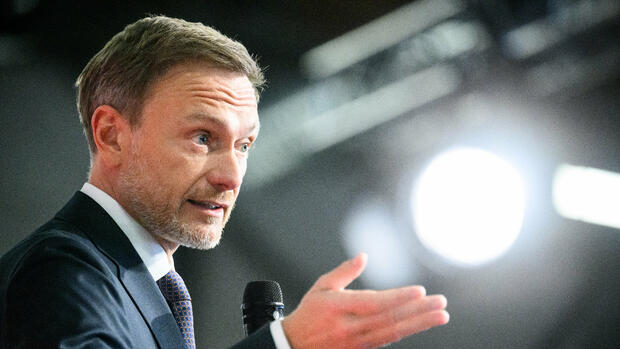Berlin The federal government is again questioning the cuts in parental allowance it has just planned. If Family Minister Lisa Paus (Greens) has concerns about the measure, “an alternative will be worked out,” said Finance Minister Christian Lindner (FDP) when presenting the draft budget for the coming year. When it came to the question of what would happen with parental allowance, “some new advice needs arose,” said Lindner.
In the course of the budget consultations, the finance and family ministries had agreed to limit the number of recipients of parental allowance. So far, families have received the benefit if the parents together have less than 300,000 euros in taxable income per year. The limit should be lowered to 150,000 euros. Depending on the tax return, this roughly corresponds to a gross income of 180,000 euros.
The cut is part of the measures to ensure compliance with the debt brake in the coming year. But after the cut became known, there was a lot of criticism. The federal government is saving at the expense of families. Both the Greens and the FDP then moved away from the savings again.
“The responsible colleague has addressed that she is not convinced of her own proposal,” said Lindner to relevant statements by Family Minister Paus. He himself was “not so convinced,” added Lindner. “I’m not a fan of income caps.”
The draft budget is now being discussed in the Bundestag. In addition, an accompanying budgetary financing law is needed: it will make legal changes in order to implement the savings. Within this framework, the savings in parental allowance can still be adjusted – or omitted entirely.
Scholz defends decision
While there are already signs of a reversal in parental allowance, the traffic light coalition is publicly arguing about who is responsible for the proposal. According to Lindner, the idea goes back to Paus. “Of course, the departments are autonomous,” said Lindner. “Federal ministers manage their departments on their own responsibility.”
As can be seen from an exchange of letters, both ministries were involved. The Ministry of Finance had proposed to the Ministry of Family Affairs to limit increases in spending on parental allowance. With this, Paus should make her savings contribution.
The responsible colleague addressed the fact that she was not convinced of her own proposal. Finance Minister Lindner on Family Minister Paus and her parental allowance proposal
Parental allowance is by far the largest item of expenditure in the Ministry for Family Affairs: this year expenditure on the benefit amounted to 8.2 billion euros out of a total budget of 13.6 billion euros. As a result of the originally planned reduction, expenditure on parental allowance should fall to 7.9 billion euros in the coming year.
Theoretically, Paus could also cut other items, such as programs to strengthen democracy or anti-discrimination. But the Greens definitely want to prevent deletions in these places. If the savings in parental allowance should now be taken back, it is unclear where Paus could then cut her budget.
>> Read here: “Catastrophic signal against children” – horror at parental allowance reduction
Chancellor Olaf Scholz (SPD) had defended the decision on Wednesday morning. “That’s very, very much,” said Scholz about the previous income limit of 300,000 euros. Even after a reduction, the core remains that more parents should be encouraged to have children.
Lindner expects tough budget negotiations in the next few years
The dispute over parental allowance is symptomatic of the budget this year. For months, Lindner had been arguing with his ministerial colleagues about possible savings so that the debt brake could be adhered to in the coming year. Chancellor Scholz had to intervene in the talks.
The cabinet approved the draft budget on Wednesday. It envisages spending of 445.7 billion euros for the coming year. The new debt should be 16.6 billion euros.
>> Read here: Draft budget is available – which ministries have to save particularly
The budget will be finally approved by the Bundestag in autumn. Until then there will be changes. “There is a need for improvement in many places in the budget,” said Green Party chief housekeeper Sven-Christian Kindler. His SPD colleague Dennis Rohde also emphasized: “The parliamentary process has only just begun.”
Scholz named defense, the transition to climate neutrality and social cohesion as budget priorities.
(Photo: dpa)
At the same time, Lindner made it clear that budgetary policy would not become any easier in the years to come. The 2024 budget is “only the beginning of consolidation efforts,” said the finance minister. “This budget is just the beginning of a trend reversal. Turnaround, that will remain an ongoing task.”
In Lindner’s financial planning, there is still a “need for action” of five billion euros from 2025. So it is still unclear where the money will come from or where the savings will be made. “The consolidation course must be continued decisively in the coming years,” said the FDP chairman. “New structural expenditure can only be realized if there is structurally effective counter-financing.”
Lindner said he would conduct the negotiations in the coming years “with the same cheerfulness” as in the past few weeks. For his cabinet colleagues, that might sound like a threat.
More: “Catastrophic signal against children” – horror at parental allowance reduction
